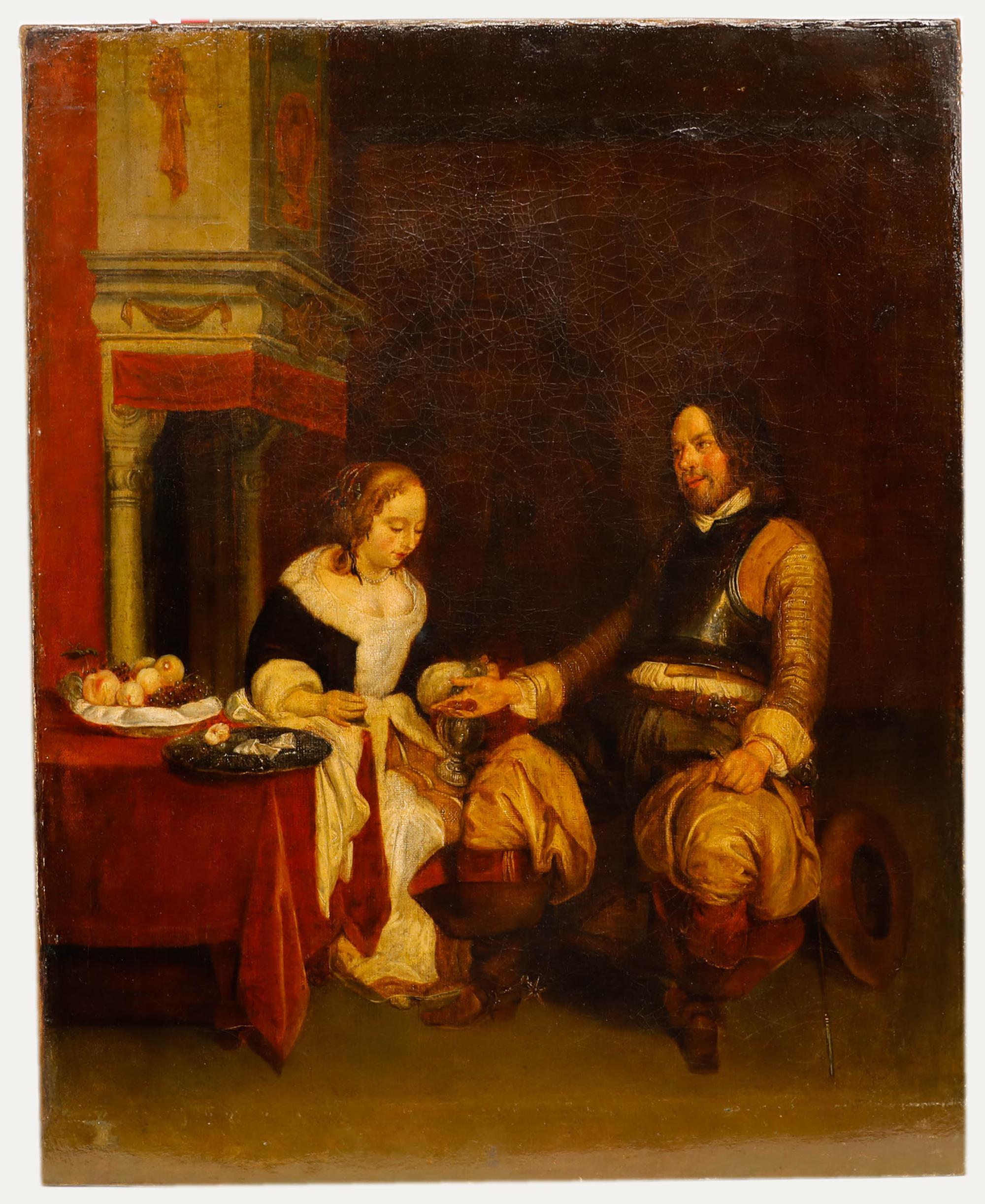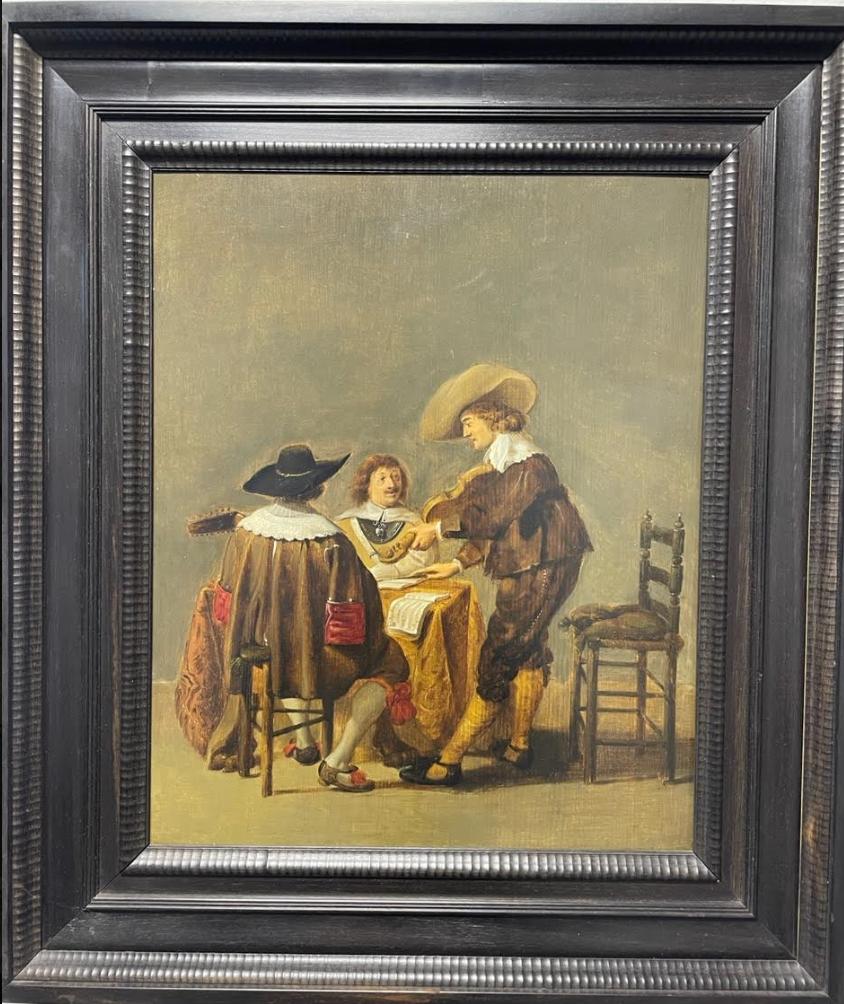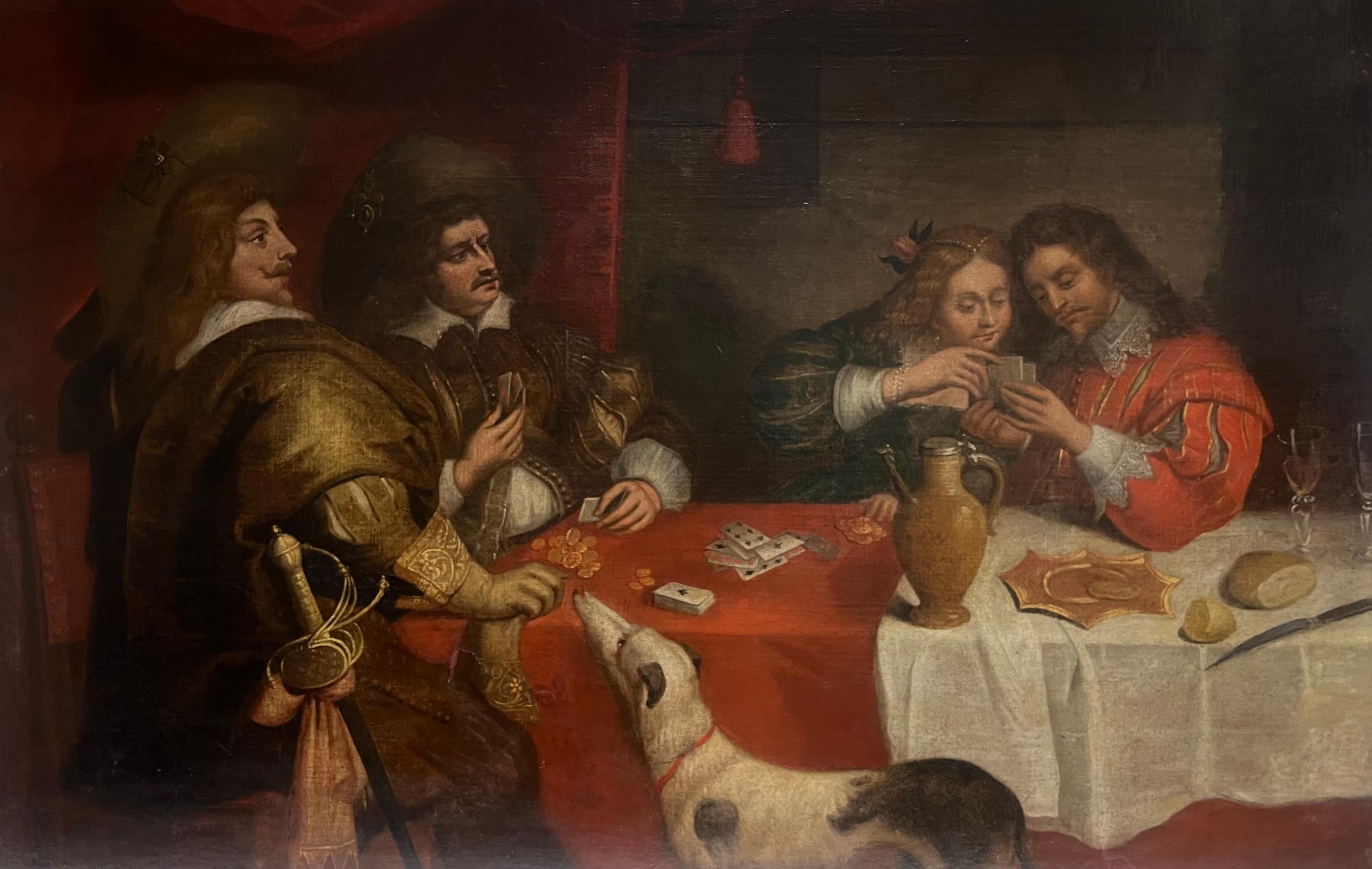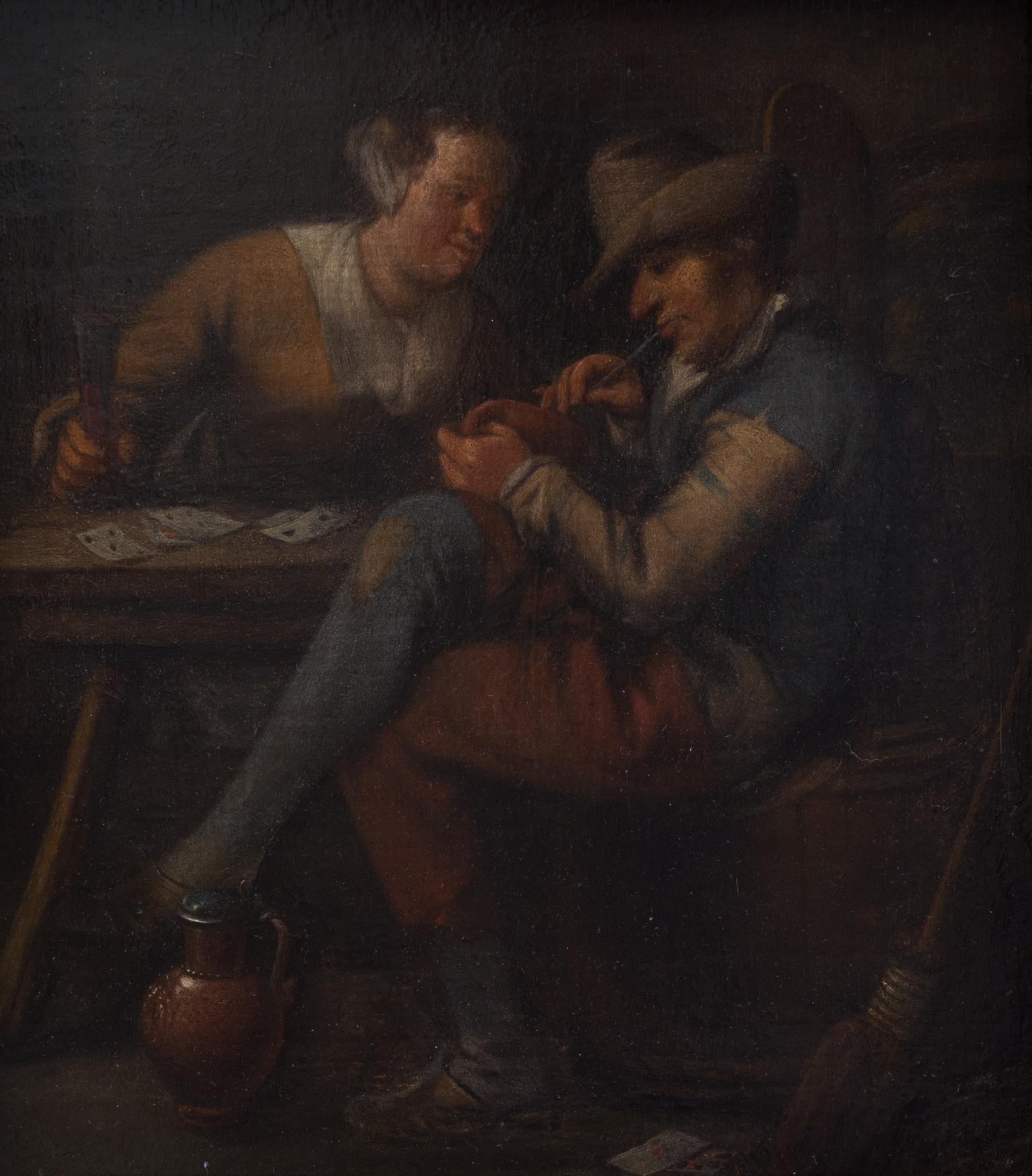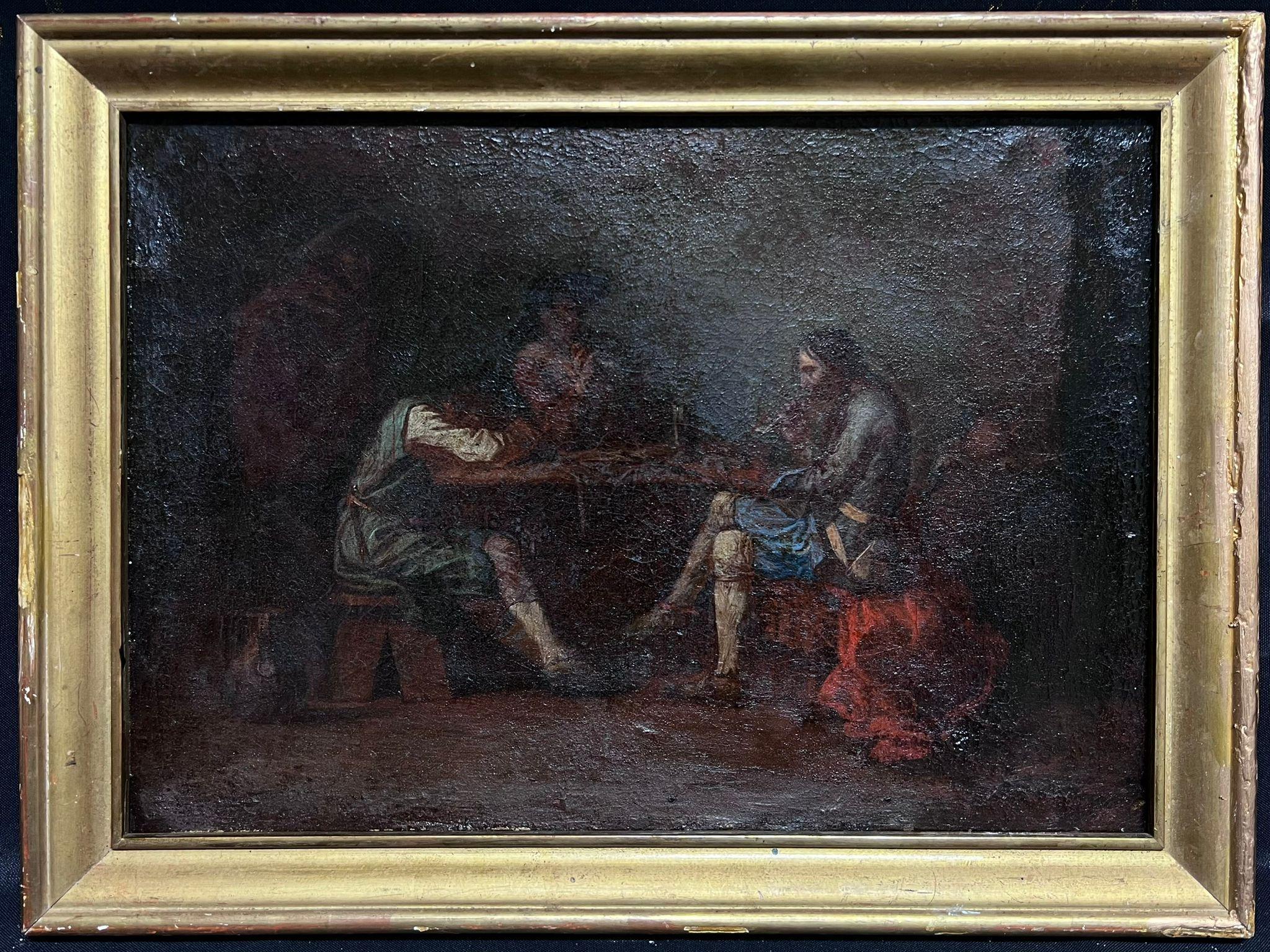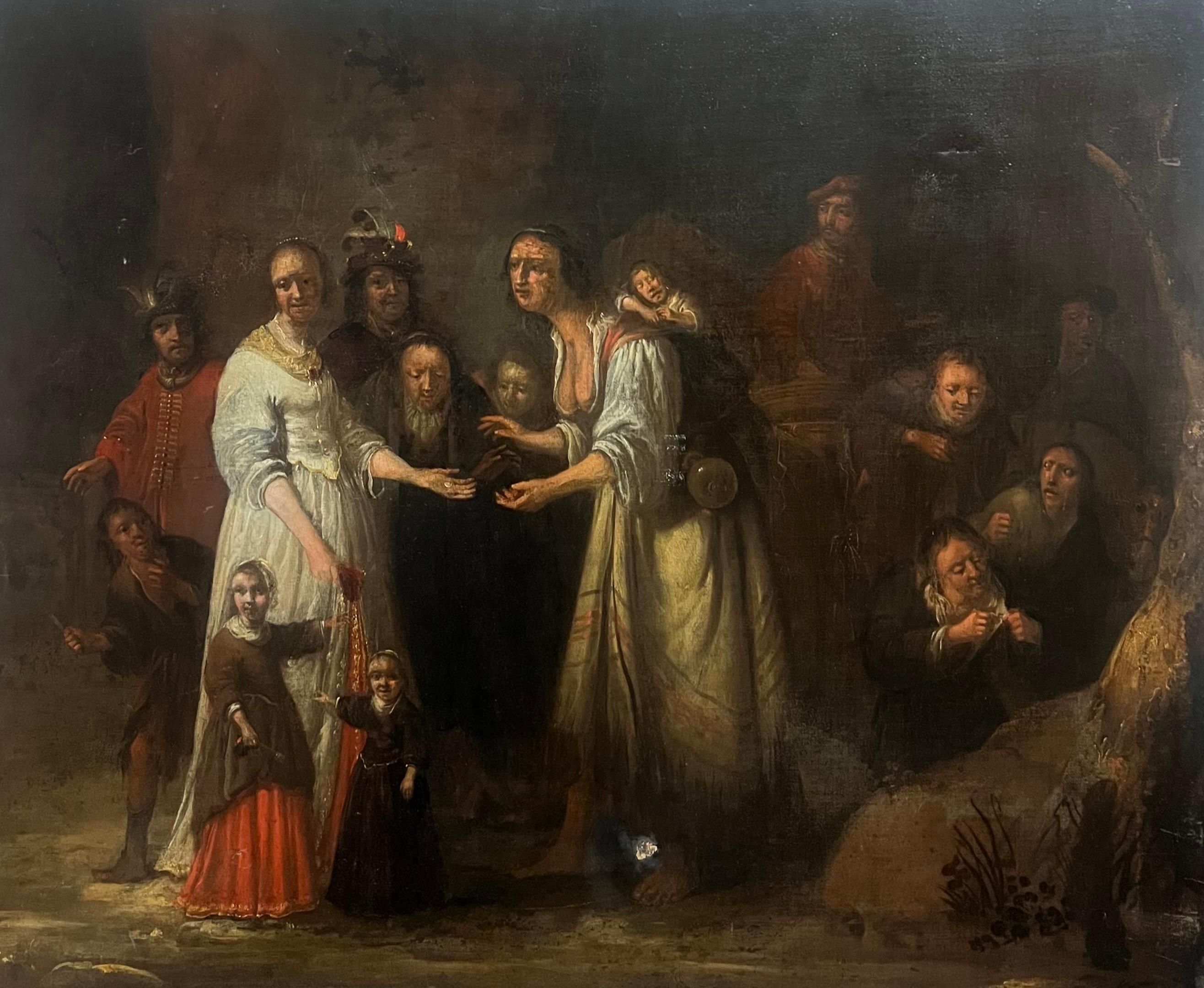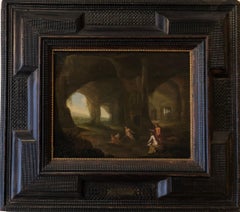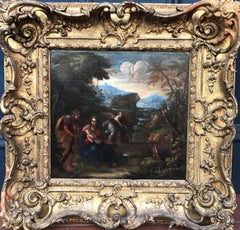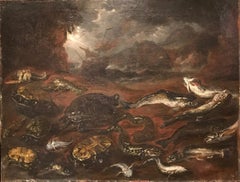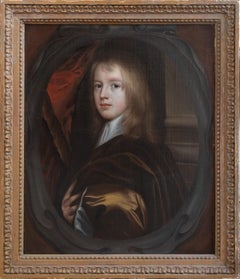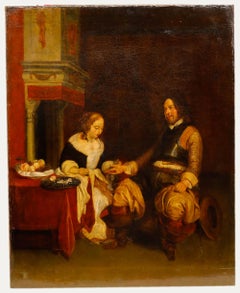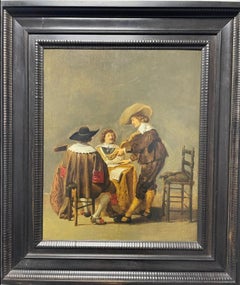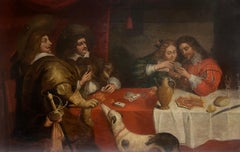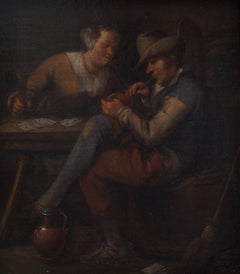Items Similar to Dutch 17th Century Oil Painting - The Card Game by Ter Borch
Want more images or videos?
Request additional images or videos from the seller
1 of 7
Gerard ter Borch the YoungerDutch 17th Century Oil Painting - The Card Game by Ter Borch
$20,411.92
£15,000
€17,622.51
CA$28,042.51
A$31,306.82
CHF 16,404.31
MX$383,226.26
NOK 208,334.84
SEK 196,433.30
DKK 131,518.60
Shipping
Retrieving quote...The 1stDibs Promise:
Authenticity Guarantee,
Money-Back Guarantee,
24-Hour Cancellation
About the Item
Gerard ter Borch
The Cards Game
Oil on canvas
14 x 15.5 inches unframed
19 3/4 x 21 1/2 inches framed
Gerard ter Borch (Dutch; December 1617 – 8 December 1681), also known as Gerard Terburg, was an influential and pioneering Dutch genre painter who lived in the Dutch Golden Age. He influenced fellow Dutch painters Gabriel Metsu, Gerrit Dou, Eglon van der Neer and Johannes Vermeer. According to Arthur K. Wheelock Jr., Ter Borch “established a new framework for subject matter, taking people into the sanctum of the home”, showing the figures’ uncertainties and expertly hinting at their inner lives.
Ter Borch is a significant painter of genre subjects. He is known for his rendering of texture in draperies, for example in The Letter and in The Gallant Conversation, engraved by Johann Georg Wille.
Ter Borch's works are comparatively rare; about eighty have been catalogued. Six of these are at the Hermitage, six at the Berlin Museum, five at the Louvre, four at the Dresden Museum, three at the Getty Center, and two at the Wallace Collection. A pair of portraits are located at the Corcoran Gallery in Washington D.C., highlighted in 2010 by Blake Gopnik.
- Creator:Gerard ter Borch the Younger (1617 - 1681, Dutch)
- Dimensions:Height: 19.75 in (50.17 cm)Width: 21.5 in (54.61 cm)
- Medium:
- Movement & Style:
- Period:
- Condition:
- Gallery Location:London, GB
- Reference Number:1stDibs: LU67334468912
About the Seller
5.0
Vetted Professional Seller
Every seller passes strict standards for authenticity and reliability
Established in 1990
1stDibs seller since 2017
42 sales on 1stDibs
- ShippingRetrieving quote...Shipping from: London, United Kingdom
- Return Policy
Authenticity Guarantee
In the unlikely event there’s an issue with an item’s authenticity, contact us within 1 year for a full refund. DetailsMoney-Back Guarantee
If your item is not as described, is damaged in transit, or does not arrive, contact us within 7 days for a full refund. Details24-Hour Cancellation
You have a 24-hour grace period in which to reconsider your purchase, with no questions asked.Vetted Professional Sellers
Our world-class sellers must adhere to strict standards for service and quality, maintaining the integrity of our listings.Price-Match Guarantee
If you find that a seller listed the same item for a lower price elsewhere, we’ll match it.Trusted Global Delivery
Our best-in-class carrier network provides specialized shipping options worldwide, including custom delivery.More From This Seller
View All17th Century Classical Oil Painting - Diana With Her Attendants in a Grotto
By Abraham van Cuylenborch
Located in London, GB
Abraham van CUYLENBROCH (1620-1658)
Diana With Her Attendants in a Grotto
1651
signed
oil on panel
12.2 in x 15.7 inches, inc. frame;
31 x 40 cm
Provenance:
Sale of Sotheby's Lo...
Category
17th Century Old Masters Figurative Paintings
Materials
Oil
17th Century Old Master Religious Oil painting - Rest on the Flight into Egypt
By Pier Francesco Mola
Located in London, GB
Attributed to Pier Francesco MOLA, called Il TICINESE (1612-1666)
Rest on the Flight into Egypt
oil on canvas
25.5 x 27 inches including ...
Category
Mid-17th Century Baroque Figurative Paintings
Materials
Oil
17th Century Oil Painting Still Life: Turtles & Fish with a Ship in Stormy Seas
Located in London, GB
A Still Life of Turtles, An Eel, Pike, Lobsters and other Fish on the Shore, A Ship in the Stormy Seas Beyond
Signed and dated lower left 1640
Inscribed with inventory number lower right: no. 44
Oil on canvas
Framed 29.5 x 37.9 inches
Provenance
Anonymous sale, London, Sotheby's, 15 April 1999, lot 87, (as 'Circle of Giuseppe...
Category
17th Century Old Masters Animal Paintings
Materials
Oil
17th Century Oil Painting Portrait of a Young English Boy
By Gerard Soest
Located in London, GB
Gerard SOEST (1600 - 1681)
Portrait of a Young Boy
oil on canvas
35.5 x 30.5 inches inc. frame
Gerard Soest (circa 1600 – 11 February 1681), also known as Gerald Soest, was a portra...
Category
17th Century Old Masters Portrait Paintings
Materials
Oil
Double Portrait Oil Painting Brothers George, 2nd Duke Buckingham & Lord Francis
By (After) Anthony Van Dyck
Located in London, GB
Aftrer Anthony VAN DYCK - maybe Studio (1599, Antwerp – 1641, London) Flemish
Double Portrait of George Villiers, 2nd Duke of Buckingham (1628-1687) & Lord Francis Villiers (1629-1648)
Oil on Canvas
170 x 147 cm
Anthony Van Dyck (1599-1641)
No painter has done more to define an era than Anthony van Dyck. He spent only seven and a half years of his short life (1599- 1641) in England. He grew up in Antwerp, where his precocious talent was recognised by Peter Paul Rubens, the greatest painter of his age. He worked in Rubens’s studio and imitated his style as a religious artist, painting biblical scenes redolent of the lush piety of the counter-reformation. But soon he was on the move. In 1620, he visited London for a few months, long enough to paint a history picture, The Continence of Scipio, for the royal favourite, George Villiers, Marquess of Buckingham, and a portrait of his other English patron, the great art collector, Thomas Howard, 2nd Earl of Arundel.
After a stint in Italy, making imposing portraits of the wealthy aristocracy and sketching and copying works by Titian, he returned to the Spanish Netherlands in 1627, becoming court artist to Archduchess Isabella before departing for The Hague in 1631 to paint the Dutch ruler Frederick Henry, Prince of Orange. Charles I’s invitation in 1632 led Van Dyck back to London where he was knighted, paid an annual salary of £200 and installed in a house in Blackfriars with a special jetty at which the royal barge might tie up when the King was visiting his studio. By this time Van Dyck was recognised as the leading court painter in Europe, with Velazquez at the court of Philip IV of Spain his only rival. He also excelled as a superbly observant painter of children and dogs.
Van Dyck’s notoriety in depicting children led to the introduction of groups of children without their parents as a new genre into English painting (amongst other new genres).
For the next 300 years, Van Dyck was the major influence on English portraiture. Nearly all the great 18th Century portraitists, from Pompeo Batoni and Allan Ramsay to Thomas Gainsborough and Joshua Reynolds, copied Van Dyck’s costumes, poses and compositions.
George Duke of Buckingham & his brother Francis Villiers
Painted in 1635, this double portrait was originally commissioned by Charles I, who raised the two brothers after their father, George Villiers, was assassinated in 1628. Together with their sister, Lady Mary Villiers, they enjoyed the King’s favour absolutely. Francis whose absolute ‘inimitable handsomeness’ was noted by Marvell (who was killed in a skirmish near Kingston upon Thames). The young duke who commanded a regiment of horse at the Battle of Worcester, remained closely associated with Charles II, held a number of high offices after the Restoration and was one of the most cynical and brilliant members of the King’s entourage, immortalised as ‘Zimri’ in Dryden’s Absalom and Achitopbel. As a young man he had sold his father’s great collection of pictures in the Spanish Netherlands, many of them to the Archduke Leopold Willhelm.
Painted for Charles I and placed near the portrait of their sister in the Gallery at St James’ Palace. The handling of both costumes is very rich, and the heads are very carefully and sensitively worked. That of the younger boy in particular is more solidly built up than the lower part of the figure. A preparatory drawing for the younger boy is in the British Museum.
There are copies at, e.g., Highclere Castle...
Category
17th Century Old Masters Portrait Paintings
Materials
Oil
Oil Painting of Landscape with 'The Papal Palace at Avignon'
By Pieter Bout
Located in London, GB
Provenance:
Sotheby’s December 5th 2006, Lot 388
Bout was a Flemish painter, draughtsman and etcher. He is known mainly for his landscapes, city, coast and country views and archite...
Category
Early 18th Century Old Masters Landscape Paintings
Materials
Oil
You May Also Like
After Gerard ter Borch (1617-1681) - 19th Century Oil, A Gallant Soldier
Located in Corsham, GB
A charming study of Gerhard ter Borch's 17th-century painting 'A Gallant Soldier'. The scene depicts a soldier and woman in a decadent interior exchanging coin. Unsigned. On canvas.
Category
19th Century Figurative Paintings
Materials
Oil
MAKING MUSIC IN AN INTERIOR, Dutch Old Master Oil on Panel
By Jan Olis
Located in New York, NY
Jan Olis was a master best known for his depiction of genre scenes while he also produced a number of portrait paintings. He worked in a style reminiscent of and was surely influence...
Category
1630s Old Masters Paintings
Materials
Oil, Panel
Huge 17th Century Flemish Old Master Oil Painting Figures Playing Cards
Located in Cirencester, Gloucestershire
The Card Players
Flemish Old Master, 17th century
based on a version (in reverse) of a painting by Cornelis de Vos (Flemish 1584-1651)
oil on canvas, unframed
Canvas: 39 x 62 inches
...
Category
Mid-17th Century Old Masters Figurative Paintings
Materials
Oil, Canvas
The Card Players by a Flemish 1600s Artist
By Flemish School, 17th Century
Located in Stockholm, SE
Flemish 1600s School
The Card Players
oil on oak panel
panel dimensions 22.5 x 20 cm
frame included
Provenance:
From a Swedish private collection.
Condition:
Flat and stabl...
Category
17th Century Old Masters Figurative Paintings
Materials
Oak, Oil, Panel
17th Century Flemish Old Master Oil Tavern Interior Drinkers Sloped over Tables
Located in Cirencester, Gloucestershire
Tavern Interior
Flemish School, 17th century
oil on canvas, framed
framed: 13.5 x 18
canvas: 11 x 16 inches
provenance: private collection, France
condition: very good and sound cond...
Category
17th Century Old Masters Figurative Paintings
Materials
Oil
Fine 17th Century Dutch Old Master Oil Painting Interior Scene Many Figures
Located in Cirencester, Gloucestershire
Alms for the Poor
by Richard Brakenburg (Flemish 1650-1702)
oil on canvas, unframed
Canvas: 25 x 30 inches
Provenance: private collection, France, extensively inscribed verso
Conditi...
Category
17th Century Old Masters Figurative Paintings
Materials
Oil, Canvas
More Ways To Browse
Antique Dutch Oil Painting
Oil Paintings Of Game
Painting By Blake
Dutch Golden Age
Antique Oil Paintings People
Dutch Oil Paintings 17th Century
Dutch Genre Paintings
Dutch Master Paintings 17th Century
Dutch Oil Painting Interior
Dutch Golden Age Painting
17th Century Dutch Portrait
Gerard Oil Painting
17th C Portrait
17th Century Dutch Portrait Oil Paintings
Gallant Paintings
17th C Dutch Portraits
Jr Louvre
Gerrit Dou
